Do you have a child who’s struggling with separation anxiety, especially at when being dropped off at school or early education? Perhaps they’re going through a developmental milestone that makes them need Mum or Dad a bit more than before. This is common starting around six months of age, peaks at 14-18 months, then can happen again when your child hits preschool and school-age. Or maybe your child is new to our service or has recently transitioned studios. The transition from home to early education is a milestone for both children and families. Separation anxiety can even happen for children who’ve been in Little Scholars for a while. It can be hard moving into a new studio where she or he doesn’t yet know new routines, where things are kept and spending time with different educators with different ways of doing things can be overwhelming for the child. This is all normal.
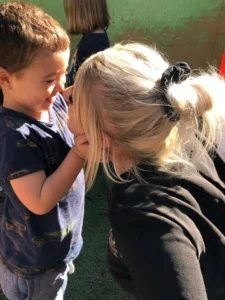
If you’re at a loss on how to make things easier on your little one, and yourself, we have some ideas.
Acknowledge and validate their feelings by saying something like “I know goodbyes can be hard, but I always come back. I will see you later today. I love you.” Give a big hug, a smile and a wink.
Then at home, if your child is old enough, have a chat about why she/he is having a hard time at drop-off, and think about what you can do to alleviate it. Ask him or her what make things easier. Perhaps it’s including a comfort toy, blanket or family photo. Maybe you each have a special bracelet that you can touch when you’re missing each other. Make a plan for something special together when you pick him or her up, like a walk or playing a game together, which will give your child something to look forward to through the day.
If you’re preparing your child to go to early education or school, it’s best they understand what their days will look like. So the conversation could look something like ‘we’ll all have breakfast together and get ready for the day. Then we’ll get in the car and first we’ll stop at Little Scholars. I’ll walk you in, give you a big hug, and you’ll go off to have a day of play while I go to work. When I finish work, I’ll jump in the car and come right over to pick you up, then we’ll go _____” These conversations may have to happen several times for it to sink in.
Also, if you’re pondering signing your child up for early education, this is why we offer play dates to children newly enroled but yet to start – this allows them to begin to become familiar with their new educators and studios.
Remember, you can always chat with your educator or campus manager about how to help. We’re always available, and we’ve been through this before, we can offer ideas or reassurances everyone will be OK!
We also know separation anxiety can be a two-way street, especially for new parents, or returning to work after maternity leave. Don’t forget we have our Little Scholars app so you can see pictures of your child, and be reassured that if there were tears from your child, they likely didn’t last long and they’re busy having fun and learning while you’re at work.
Related links:
We adore the endless stream of questions that little ones bring to us every day! From an early education standpoint, we want children to learn at every opportunity. Children are inquisitive beings, and they have lots to learn! At Little Scholars, we cherish this innate curiosity in children and strive to foster a lifelong passion for learning.
As parents and educators, we understand that some questions from our little ones can catch us off guard, leaving us searching for the right words to provide age-appropriate answers. We’re here to lend a helping hand, so let’s tackle a few of these tough questions together!
How are babies made/how did a baby get in a mummy’s belly?
Children at this age are curious about the beginning of life. You can answer simply, “A tiny seed, called sperm, from the daddy joins with a special egg from the mummy, and that’s how a baby starts to grow inside the mummy’s belly.” They may understand it like a fruit grows from a seed. For young children, this should satisfy the question. You may want to explain it’s not the same kind of egg we eat for breakfast!
What does dying mean?
The concept of death can be challenging for young children to grasp. We think it’s important to be honest here. You can say, “Dying means that a person’s body stops working, and they don’t feel pain anymore. They don’t breathe, eat, feel hungry or cold. It’s a natural part of life’s cycle, like when leaves fall from a tree in the autumn.” This is a topic that may be followed up with further questions, such as ‘will I die or will you die?’ and be honest. “Yes, we all die. But I hope to be around for a really long time. I have no serious illnesses that could change that.”
What happens to us when we die?
For toddlers and preschoolers, you can offer a comforting response like, “When someone dies, they become like a beautiful memory in our hearts. We remember all the happy times we shared with them, and they will always be a part of us.” If your family has cultural or religious beliefs around death, this may be the place to share, “in our family and our culture/religion, we believe when the body dies ______.” Your child may work through this further through their play, but just be there for them and prepared to revisit this topic.
How come Louis has two dads?
Children may notice different family structures. You can say, “Families come in all shapes and sizes. Louis is very lucky to have two dads who love and care for him just like your mummy and daddy love you.”
Why does Ashley’s mum live in a different house from her dad?
When answering a small child’s question about why a couple has divorced, we think a simple, honest, and age-appropriate response that takes their emotional well-being into consideration works best. Here’s one way to address the question: “Sometimes, mummies and daddies decide to live separately because they have found they feel happier when they have some space. It’s like when friends need some time apart.
If it’s your separation, your child will need a lot of reassurance from you. “Even though mummy and daddy won’t be living in the same house, we both still love you very much, and we will always be there for you. You will have special time with both of them, and we will continue to love and care for you in different homes.”
Young children may have a limited understanding of complex situations like divorce, so keeping the explanation simple and reassuring them of their parents’ love is crucial. Encourage them to share their feelings and questions, and assure them that it’s okay to talk about their emotions. Creating a supportive and open environment helps children navigate through changes and emotions in a healthy way.
What happened in the news that’s making everyone so sad?
Addressing sad news can be tricky. Open the discussion by asking your child what they know about what’s happened in the news. This is a good opportunity to correct false information and provide context. Remember to use age-appropriate language. Check your child’s understanding throughout the conversation and allow them to ask questions. You can say, “Sometimes, sad things happen in the world, and it can make people feel upset. It’s okay to feel sad or worried, and we can always talk about our feelings with someone we trust. You can always talk to me about anything.”
I’m scared, why is the weather so bad?
Living in Queensland, while wonderful most of the time, also means we face all kinds of weather events, such as flooding, bush fires and extreme heat, and cyclones. Unusual weather can be scary for young children, so it’s important to stay calm and make sure the information you give them is age-appropriate and simple to understand.
It’s natural for children to feel scared, so reassure them with calm and simple words. Acknowledge their feelings and let them know they are safe. You might say:
“I can see that you’re worried, and that makes sense. These weather events can be scary, but we are safe. People are working hard to protect us, and we keep learning how to stay even safer in the future.”
Thunderstorms
Thunderstorms occur when warm, moist air rises rapidly into cooler parts of the atmosphere. As the air cools, clouds and rain form. Inside the clouds, lightning, a form of electricity, builds up. When lightning strikes, it heats the surrounding air, causing it to expand quickly and create the sound of thunder – BOOM! At the same time, cooler air sinks toward the ground, leading to strong winds.
Cyclones
A cyclone happens when warm air over the ocean rises up, creating a low-pressure area that pulls in cooler air, making it spin around like a whirlpool, and as the air gets higher, it cools down and forms clouds, bringing heavy rain and strong winds; basically, it’s like a big spinning dance of hot and cold air over the sea! These winds and rain can cause damage, but this is why we have emergency services to help keep us safe, and life will eventually go back to normal.
Flooding
Floods happen when it rains heavily for a long time, causing rivers, canals, creeks and oceans to overflow and water to spread onto land that is normally dry. It’s a natural event, and not anyone’s fault, and that while sometimes scary, there are ways to stay safe and prepared!
Bush fires
Bushfires happen when dry conditions, high temperatures, and strong winds cause trees and grass to catch fire. Sometimes, they start naturally, like from lightning, and other times, they are caused by people. Firefighters and experts work hard to prevent and control them to keep people and animals safe.
Why is the sky blue?
The secret behind the blue sky lies in something called “Rayleigh scattering”. It’s a fancy scientific term, but it’s a super interesting phenomenon that helps us understand why the sky is blue. When sunlight enters the Earth’s atmosphere, it interacts with tiny particles like dust, water vapour, and pollen. This mixing causes the sunlight to scatter, or spread out, in all directions. When light waves hit these particles, they bounce off and scatter in different directions, just like water droplets scatter after you throw a rock into a pond.
Now you might ask, “Why is the sky blue and not another colour?” That’s because blue light has a shorter wavelength than other colours of light, like red or yellow. Shorter wavelengths scatter more easily when they interact with the tiny particles in the atmosphere. So, when we look up at the sky, we see more blue light than other colours.
But guess what? The sky isn’t always blue! Sunrises and sunsets are not only beautiful but also full of science. The colours we see during these times depend on the angle of the sun and the distance its light travels through the atmosphere. The lower the sun is in the sky, the more atmosphere the light has to pass through. This causes shorter wavelengths, like blue and green, to scatter more, leaving the longer wavelengths, like red and orange, to dominate the sky. That’s why we see those breathtaking colours during sunrises and sunsets!
Clouds, pollution, and weather can also change the sky’s colour, making it look grey, white, hazy, or yellow.
Where do birds go at night?
Children might wonder where birds go when it gets dark. You can say, “Birds have special nests or cozy spots where they rest at night, just like we have our beds to sleep in.
How do plants grow?
Children might be fascinated by the growth of plants and flowers. You can say, “The plants have roots at the bottom that absorb water and minerals in the ground, and then the stem starts growing. With the help of the sunlight, the stem grows in branches. Green leaves start growing out of the branches. The five things plants need to grow are sunlight, water, minerals, and food..
Why do we have seasons?
Seasons happen because the Earth goes around the sun. The Earth travels around the sun, called an orbit, once a year or every 365 days. As the Earth orbits the sun, the amount of sunlight each location on the planet gets every day changes slightly. This change causes the seasons. When it’s closer to the sun, it’s warmer, and when it’s farther away, it’s cooler.
Where does rain come from?
Children may be curious about rain and weather. Sunlight heats up water on Earth’s surface. The heat causes the water to evaporate/dry up into the sky, or to turn into water vapor. This water vapor rises into the air and makes up clouds. As the water vapor cools, it turns back into water, in the form of droplets or rain drops.
How do airplanes fly?
Little ones might be fascinated by airplanes in the sky. “Airplanes have special wings that help lift them into the air. When they move forward, the air goes over and under the wings, which creates lift and allows the airplane to fly.”
If they have follow-up questions, we liked the answers from Britannica Kids.
Why do I have to go to bed early?
Children may question bedtime rules. You can say, “Going to bed early helps our bodies and minds rest and get ready for a new day of fun and learning.”
Why do I have to eat vegetables?
Answer with something like, “Vegetables have special nutrients that help our bodies grow strong and healthy. They are like superhero foods for our bodies! We need a variety of food that have different types of nutrients so our bodies can get everything they need to be the best they can be.
How come your body doesn’t look like mine?
We bet you thought the puberty question would come later! But nope, your child has noticed there’s a slight difference between their bodies and their parents’ bodies. We know this can feel awkward to answer, but your child doesn’t understand why it could be hard for their parents to explain, so use proper words and keep it simple.
It’s okay not to have all the answers, and it’s perfectly fine to keep explanations simple and age-appropriate. If you don’t have the answers, you can look it up together. By embracing your child’s questions and engaging in open conversations, you’re nurturing their curiosity and building a strong foundation for their learning journey. Be sure to let your lead educator know you’re having these conversations at home. Your child is likely not the only one wondering some of these questions, and your educators can find ways to help them understand life’s curiosities!
At Little Scholars, we have four pillars that underpin everything that we do at Little Scholars – for our children, families, educators, and our community.
As part of our annual awards, we have four awards dedicated to those Little Scholars’ values – learn, grow, inspire and contribute. This year, while our award-winning educators certainly personify all four pillars, but with their unique special skills and achievements, we’ve declared one clear winner for each pillar.
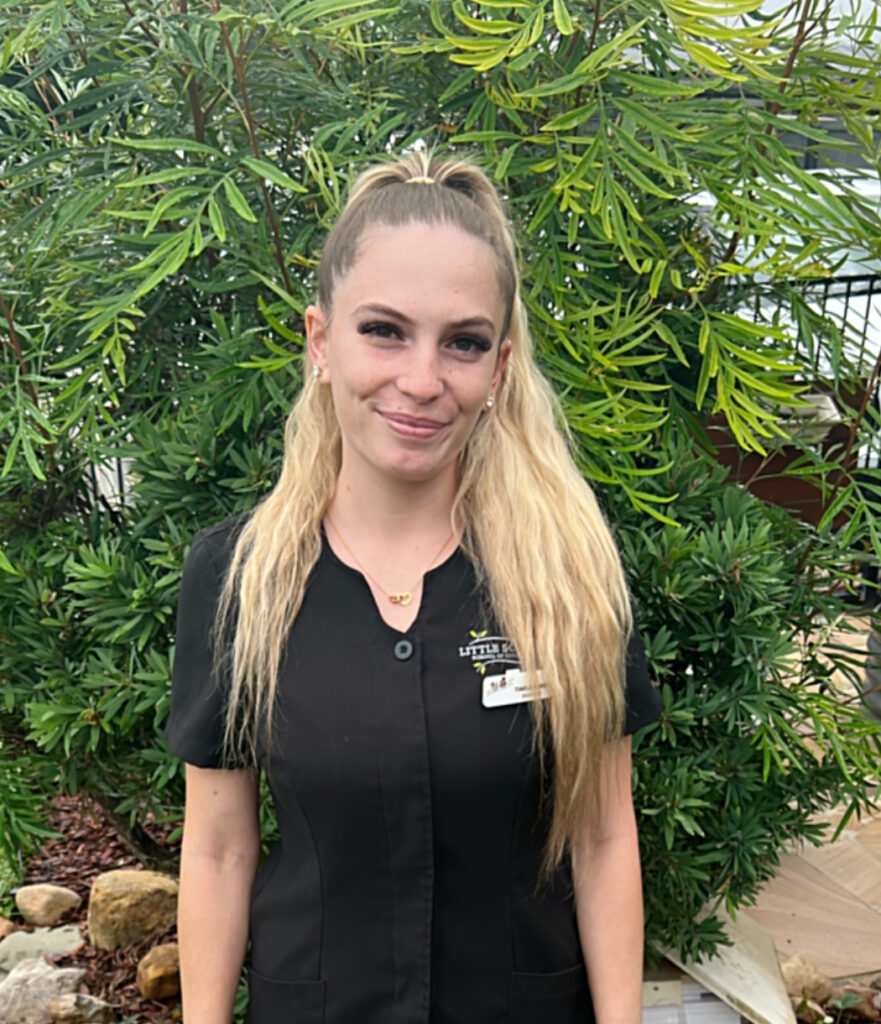
Tiahla at our Ashmore campus was named winner of the Pillar Award in the Learn category because she stepped up to become a lead educator, and she is happy to keep learning from her peers and further her education in the sector.
How long have you been an educator?
Four years
What made you pursue a career in early childhood education?
I feel like it was supposed to be as it all fell into place. I just came out of a casual job seeking for a new career journey and a job at Little Scholars Ashmore popped up. I applied for it and received the role the exact same day.
What’s the most rewarding and most challenging parts of your role? Watching their personalities blossom from a very young age, celebrating their personal developmental milestones with the children and building amazing relationships with families.
The most challenging part would be watching the children you have taught over the years move on to big school. We miss them so much!
What does winning this award mean to you?
Winning my award has meant the world to me, it makes me feel as though my progression and my achievements as an educator are noticed and valued.
Tahlia’s nomination
“Tiahla is always putting her hand up to learn new skills,” says Elise, campus manager for Little Scholars Ashmore.
“She is eager to grow from her peers, and will ask for help and support to build on her knowledge as an educator.”
Tiahla finished her Cert III and was keen to study her Diploma right away, Elise says.
“Tiahla has a bright future as an early childhood educator, as she values the importance of professional and personal growth through learning and collaborative partnerships.”
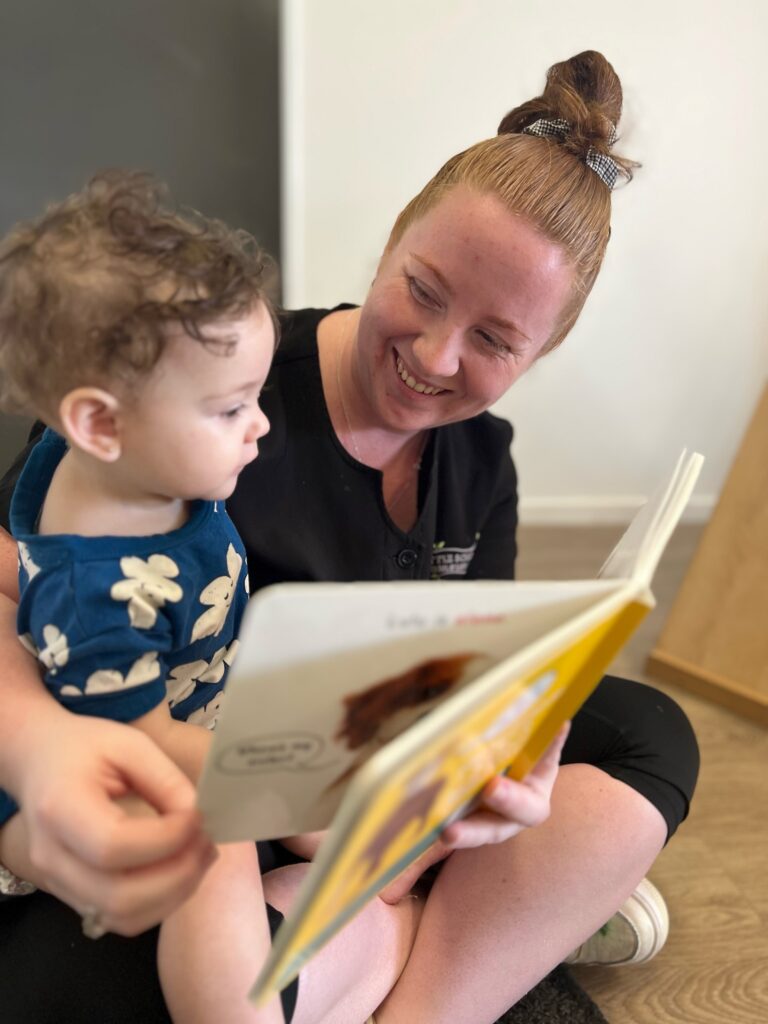
Keeva is an educator at Little Scholars Redland Bay South and is the recipient of an Inspire Little Scholars Pillar Award 2024.
How long have you been an educator, Keeva?
I have been an educator since 2016, so eight years now and have been with Little Scholars Redland Bay South since January 2023.
What made you pursue a career in early childhood education?
When I first started in early childhood education, I was studying an accounting degree, I quickly came to realise that I wanted to focus on my early childhood career. I fell in love with the children, how incredible they are and how much they could teach me. It wasn’t just the children that I fell in love with but also the challenges and limitless knowledge I could acquire and learn from to be the best educator possible.
What’s the most rewarding and most challenging parts of your role?
The most challenging part of my role is that I want to spend as much time as possible with each individual child everyday teaching them and learning from them but there is not always enough time. The most rewarding part of my job is watching the children hit all their goals and the excitement they display when they see us or accomplish goal. Mentoring and supporting other educators and seeing how far they have come in their journey is another rewarding aspect always leaving me feeling proud of their accomplishments.
What does winning this award mean to you? I was so shocked to receive this award, as I just turn up to work each day to do my best to support and guide both the children and educators. It felt so good to know that what I do each day is being noticed. It definitely makes you feel like you are doing a great job. To be recognised for the support and guidance I provide was so special and my heart felt full of love for my team. To me it cemented the fact that I am becoming the educator I always wanted to be
Keeva’s nomination
In Keeva’s nomination from Redland Bay South campus, it said, “Keeva is an educator who truly embodies each of the little scholars core pillars.
However, it is Keeva’s ability to inspire those around her, that is one of the most outstanding qualities. Keeva invests in mentoring those around her, inspiring their abilities to grow as educators utilising her existing knowledge and ability to learn more through professional development, to inspire each person to grow to full potential.”
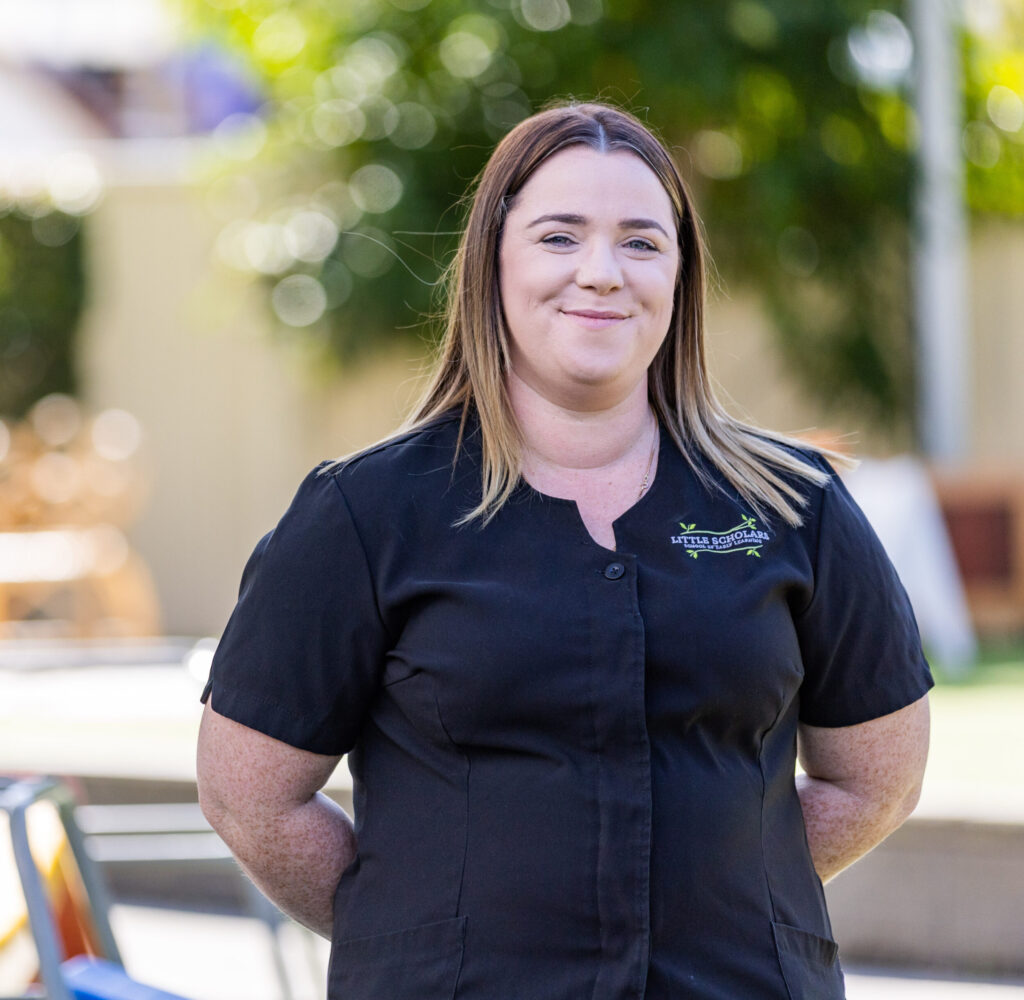
Claire is the educational leader at Little Scholars Nerang campus and has been awarded the 2024 Contribute pillar award.
How long have you been an educator and how long with Little Scholars?
I have been an early childhood educator for 18 years and with Little Scholars for nearly six years.
What made you pursue a career in early childhood education?
I’m not quite sure when I decided this was the path I wanted to take as I feel like it’s been my career goal since I was little. I still remember the way one of my kindergarten teachers, Miss Anderson, made me feel. She was fun, caring, and knowledgeable. I wanted to be that for someone and help children to learn in their own time and style. I liked the idea of being able to help shape the minds of little ones and set them up to be kind, respectful humans.
What are the most rewarding and most challenging parts of your role?
As educational leader within my campus, the most rewarding part of my role is watching both the children and educators flourish and grow as humans. It fills me with so much pride to watch the children reach their milestones and celebrate their successes with them as much as it does when educators gain new skills that help them in their professional career.
My biggest challenge is saying goodbye to the children as they venture off on their next journey into formal schooling. It happens each year but never gets easier to see them go after watching them grow and develop over the years.
What does winning this award mean to you?
Winning this award makes me feel like I am on the right path to creating what I hoped to. It reinforced the fact that I am in the right career and doing the right things to help create a better future and bring our campus closer to our local communities. I feel so proud to be recognised as the 2024 contribute pillar winner.
Claire’s nomination
Renee, campus manager, said, “Claire has remarkable attributes and will contribute to anything and everything you can throw at her.
She is passionate about supporting others and always willing to participate in any type of event, including her own professional growth.
Claire is dedicated within our Little Scholars family and her years with us is another wonderful example of her contribution to our sector.”
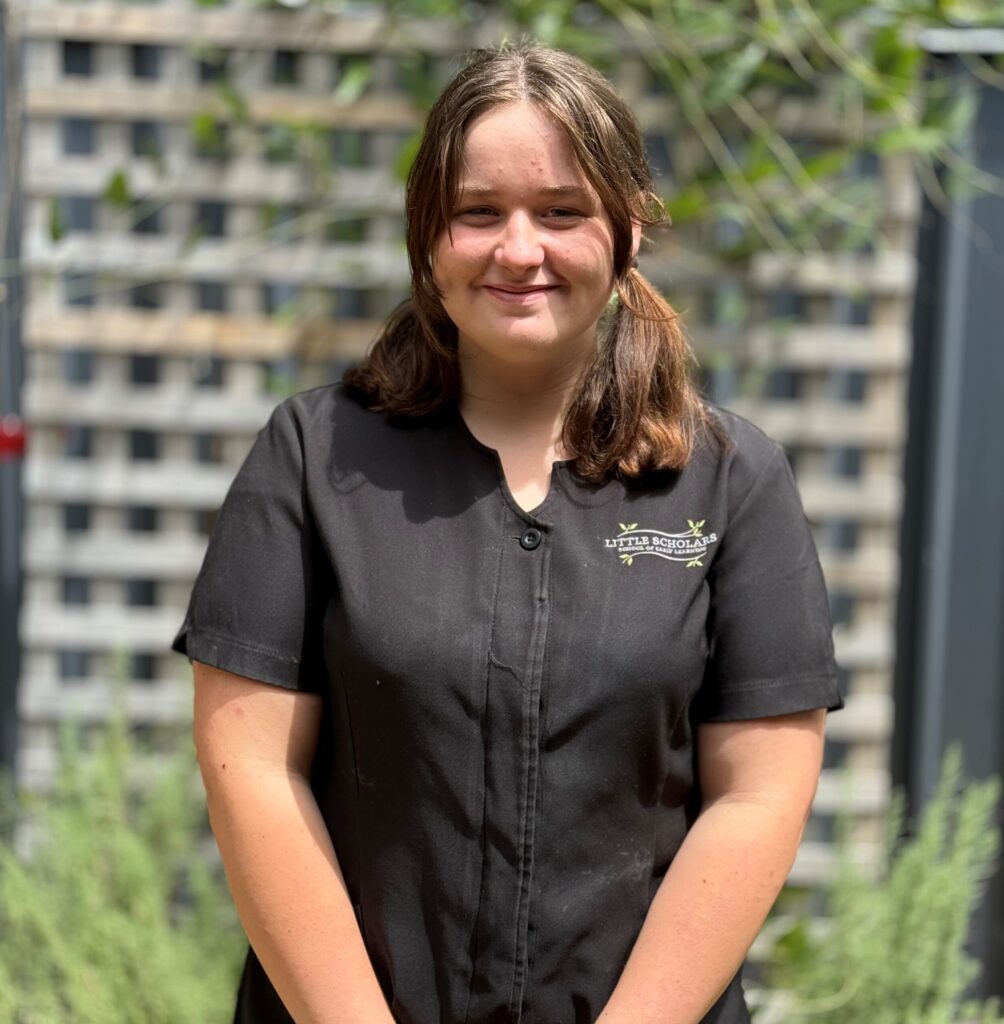
Stefenie, an educator at our Yatala campus, has remarkable attributes and we’re told her growth as an educator has been propelled by her enthusiasm to contribute, learn and inspire her team and go above and beyond not only for children, but families as well.
How long have you been an educator and with Little Scholars?
I have been an educator with Little Scholars for three years.
When you started, what was it about the role that made you want to stay in the sector?
When I was completing my work experience at the Yatala campus, I loved the relationships I was building with the children and I could see the impact educators had on the children.
What’s the most rewarding and most challenging parts of your role? The most rewarding part of my role is building such strong relationships with the children. The most challenging part is because I am so use to the younger age group, when I’m with the older children, I have to adjust my teaching style and interactions to their age groups.
What did being recognised for the Grow award mean to you?
It was really special because it really made me see how far I’ve come since being a 16 year old school based trainee. My confidence with the children and families, as well as my knowledge on child development has strengthened so much. I am a completely different educator and the fact that my leadership team can see and recognise it, it is a very special feeling.
Stef’s nomination
Stef at our Yatala campus was named winner of the Pillar Award in the Grow category because she’s grown from a trainee at the campus just a few years ago to now full time educator.
Sasha, campus manager at Little Scholars Yatala had this to say:
“Stef! What a superstar you are, and what a year you have had! From completing your Cert III as a school based trainee to jumping straight into full time work with us and then to go straight to studying your Diploma, nothing can stop you from achieving your goals, and we are so proud of how far you have come and the growth that you have achieved.”
If you’re a parent of more than one child, or spend time with children of varying ages, you may already see the benefits of those children interacting with each other. In early learning, while we arrange for children of similar ages or development together most of the time, we do make time and space for children to spend time with older and younger children. Why? There’s a lot of research supporting children of various ages and abilities spending time together. We’ll look at a few of these studies and hear from some of our Little Scholars educators who can attest to the advantages of mixing things up!
As an early education provider, we tend to group children together who share similar abilities, who are at similar stages of development or of similar ages. The benefits of this include:
Keeping children together of similar also means they’re stimulated appropriately at each age. Educators can tailor the curriculum to meet the specific developmental needs and milestones common to that age group, making learning more targeted.
As well, being with peers at the same developmental stage allows for more accurate assessment of a child’s progress and needs, aiding in early identification of any learning or developmental challenges, and children of the same age often share similar interests and play preferences, making it easier to form friendships and social bonds.
With a narrower age range, the skill gap between the most and least advanced children in the class is reduced, making group activities more cohesive, and children may feel more at ease and less intimidated when surrounded by peers who are at the same developmental stage, boosting their confidence in social and learning situations.
It also allows educators to be able to use age-appropriate language and teaching methods that resonate with the entire room, making instructions and lessons more effective.
It’s of course true that within ages of studios, for example the nursery, the milestone range can be large – a six month old infant isn’t at the same place a 12-month-old is, and even a 15 month old, but they’re similar enough in their needs that it makes sense to group them together. Our educators plan experiences that focus on movement skills, language development, fine motor development, and strengthening of developmental milestones based on the interests of the babies and research.
For toddlers, who are roughly 18 months to three years old, most are walking by this stage, some of them are learning to speak, sharing with other children and becoming potty trained. For toddlers, the curriculum includes a lot of opportunities for little ones to move their bodies and expel some of that endless energy, but a big focus is on communication and language development, which is why we help your child get to know sounds, words and language, including early literacy and numeracy and social and emotional development.
Then of course, there are our three to five-year-olds, who are further developing their language and literacy skills, fine and gross motor development and more. They are learning to work together in groups as well as individually, all in the build-up to formal schooling.
This is all to say there’s important reasons why our little scholars generally are grouped within similar ages and abilities in their studios. But this does not mean we don’t want them interacting with other children! The opposite, in fact.
The idea to mix aged groups in early learning is of course not a new concept. Here’s two of many theorists of early childhood who supported the idea of bringing children together of mixed age and abilities.
Maria Montessori, the founder of the Montessori method, was a strong advocate for mixed-age classrooms. She believed that older children could serve as role models for younger ones, fostering a sense of community and collaborative learning.
“One of the most important aspects of our education system is the use of the mixed age group which allows all the children to find what is suitable for them, irrespective of their age, and which allows the younger children a graded series of models for imitation, and the older ones the opportunity to reinforce their own knowledge by teaching what they know.”
Now, Montessori classrooms often have children of varying ages working together, which she believed promoted social and emotional development.
Lev Vygotsky, a Russian psychologist, also supported the idea of mixed-age play through his theory of the Zone of Proximal Development (ZPD). According to Vygotsky, children can learn more when they interact with peers who are slightly more advanced than they are. This aligns well with the concept of mixed-age play, where older children can guide younger ones, helping them to reach higher levels of understanding and skill.
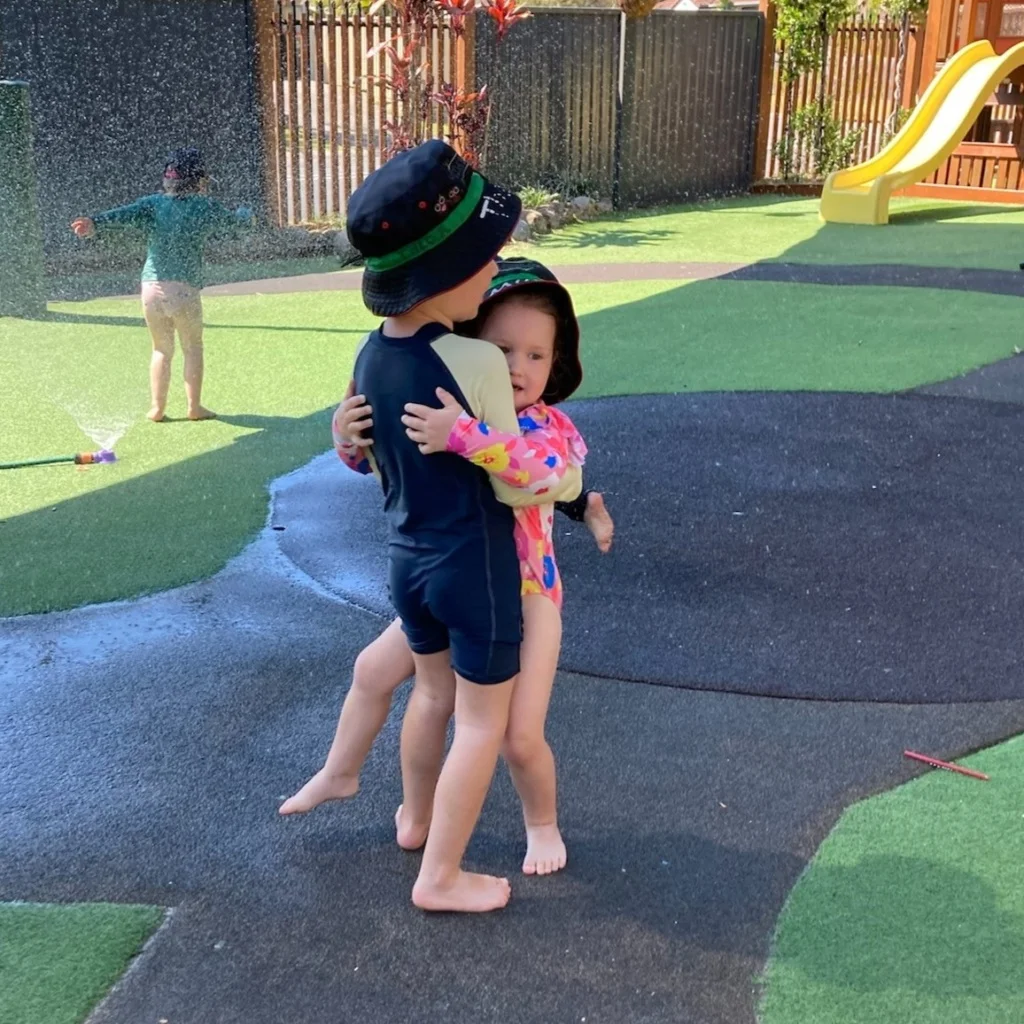
Theo (5) and little sister Mila (3) often get to spend time with each other at our Nerang campus, despite their age difference!
The benefits to having children visit with different age groups are plentiful.
Older children provide leadership and support to younger ones, enhancing skills and confidence for both.
At all of our campuses, there are several sets of siblings. By allowing siblings to interact, it can help younger ones adjust to the care environment.
Even if children don’t have siblings at their campus, mixing with younger children gives them the chance to take on ‘big sibling’ roles.
The benefits also include:
Fosters tolerance and diversity, benefiting children with developmental delays as well.
“I believe that children should have the ability to socialise with children of various age groups,” says Claire, the educational leader at Little Scholars Nerang. “Allowing opportunities for siblings to group together while at the service can assist children to feel a sense of belonging and ease separation anxiety throughout the day.”
For younger children, they can learn from a peer more knowledgeable than themselves, it teaches them problem solving skills and more, says Claire. For the older children, it teaches them nurturing, patience and understanding.
Claire shared a story of one mixed age grouping of two children who weren’t related.
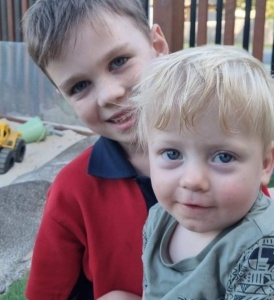
Jacob and Finn are six years apart, share a birthday and have a unique bond at Little Scholars Nerang
“Jacob and Finn are six years apart. Finn began his Little Scholars journey at four months old and took an immediate liking to Jacob aged six at the time. Throughout their friendship, Jacob has assisted Finn to learn how to talk, build and walk. Finn shows great excitement to see Jacob each day by looking for him and can now ask where he is. Finn and Jacob spend time reading and playing together. Jacob uses the abecedarian approach of see, show, say when reading to Finn to build his cognitive skills more specifically language. Each morning and afternoon they spend time together and Finn continues to develop his skill set.
Mixed age grouping for children struggling socially
In 1990, a study in the United States looked at how being in a group with children of different ages could help preschoolers who were having a hard time making friends. The study had 24 children who were either acting out or keeping to themselves. These little ones were put into one of three groups:
The results showed that the children who played with younger, socially skilled children improved the most. They were more likely to make friends and were less likely to act out or keep to themselves.
So, this study tells us that mixing children of different ages can really help those who are struggling to make friends. It can boost their social skills and help them get along better with others.
Complex play in mixed age groups
Another American study found that children in mixed-age classrooms were more likely to engage in complex play modes than children in same-age classrooms.
Over a course of 18 months, there were 47 children who participated. The researchers, from George Mason University, used a variety of methods to collect data, including direct observation, parent questionnaires, and teacher reports.
One of the key findings of the study was that children in mixed-age classrooms interacted more with their same-age peers over time. The researchers suggest that this is because children learn from each other. For example, older children may teach younger children new skills, and younger children may help older children to develop their social skills.
The study also found that older children in mixed-age classrooms became more like younger children, and younger children became more like older children. This is known as bidirectional socialisation. The researchers suggest that bidirectional socialisation may benefit both older and younger children. For example, older children may learn to be more patient and nurturing, and younger children may learn to be more independent and self-reliant.
Overall, the study provides evidence that mixed-age classrooms can have a positive impact on children’s social and behavioral development.
Vocabulary growth in mixed-age groups
A Danish study found that children in mixed-age classrooms had greater gains in vocabulary growth than children in same-age classrooms.
The researchers followed the same group of children over time. The study began when the children were two years and nine months old and ended when they were six years and 11 months old.
The researchers didn’t specify how many trials they conducted, but they did report that the study included 2,743 children. The minimum age difference between children in the same classroom was six months, and the maximum age difference was 24 months. The researchers found classrooms with a maximum age range of 24 months were associated with the greatest gains in vocabulary growth.
To measure children’s vocabulary development, the researchers used a standardised vocabulary test. They gave this test to the children at the beginning of the study and again at the end of the study.
The researchers did not directly observe how the children interacted with each other. However, they did collect data on children’s social interactions through teacher reports and parent questionnaires.
Overall, the study provides evidence that mixed-age classrooms can support children’s language development. However, more research is needed to understand the specific mechanisms through which mixed-age grouping benefits children.
How teachers support mixed age groups
Another study, this time from Sweden in 2022, focused on how preschool teachers implement curricula in different age group settings. The study involved 3,340 children between the ages of two years and nine months and six years and eleven months, from multiple preschools and was based on interviews with teachers.
The study aimed to answer two main questions:
In age-homogeneous groups, teachers felt they could focus on specific age-related goals, whereas in mixed-age groups, the curriculum was more flexible, allowing children to learn at their own pace. The study concluded that both age-homogeneous and mixed-age groups have their own sets of advantages and challenges when it comes to implementing the curriculum.
Researchers focused on the impact of mixed-age groups on children’s development, particularly in vocabulary. The study found that mixed-age groups could be positively linked to individual children’s development, especially in vocabulary.
Advantages of mixed-age groups:
Disadvantages or challenges:
The study suggests that mixed-age groups can be beneficial for children’s development, but they require a specific type of teaching approach.
As you have now read, the benefits of mixed-age play in early learning are plentiful and supported by a wealth of research and educational theories. While it’s common to group children by age or developmental stage, there’s undeniable value in allowing children of different ages to interact. Studies have shown that this kind of grouping can enhance social skills, encourage more complex play, and even boost vocabulary development. Our educators at Little Scholars witness these benefits daily and incorporate mixed-age interactions into our curriculum.
However, it’s not just about mixing ages for the sake of it; it’s about creating a dynamic learning environment that caters to the individual needs of each child. Whether it’s older children mentoring the younger ones or everyone learning to communicate at different levels, the advantages are clear. But it’s not without its challenges; it requires a nuanced approach from educators to ensure that each child’s developmental needs are met. So, while there’s no one-size-fits-all approach to early education, the evidence points towards the value of a mixed-age setting in helping our little scholars grow into well-rounded individuals.
The Case for Mixed-Age Grouping in Early Education (1990) by Lilian G. Katz, Demetra Evangelou, and Jeanette Allison Hartman
The social and behavioral ecology of mixed-age and same-age preschool classrooms: A natural experiment (2002) by Sarah Caverly and Adam Winsler.
Does mixing age groups in early childhood education settings support children’s language development? (2017) by Nina S. Mounts, Jaipaul L. Roopnarine, and Peter B. Smith.
Teaching and learning in age-homogeneous groups versus mixed-age groups in the preschool (2022) by Lena O Magnusson and Kerstin Bäckman
The Little Scholars School of Early Learning recently joined forces with Southern Cross University for an innovative project, looking at how children engage and interact with social robots. NAO is a social robot that has been programmed to interact socially with people and this digital tool has the potential to serve as an educational aide in early learning settings.
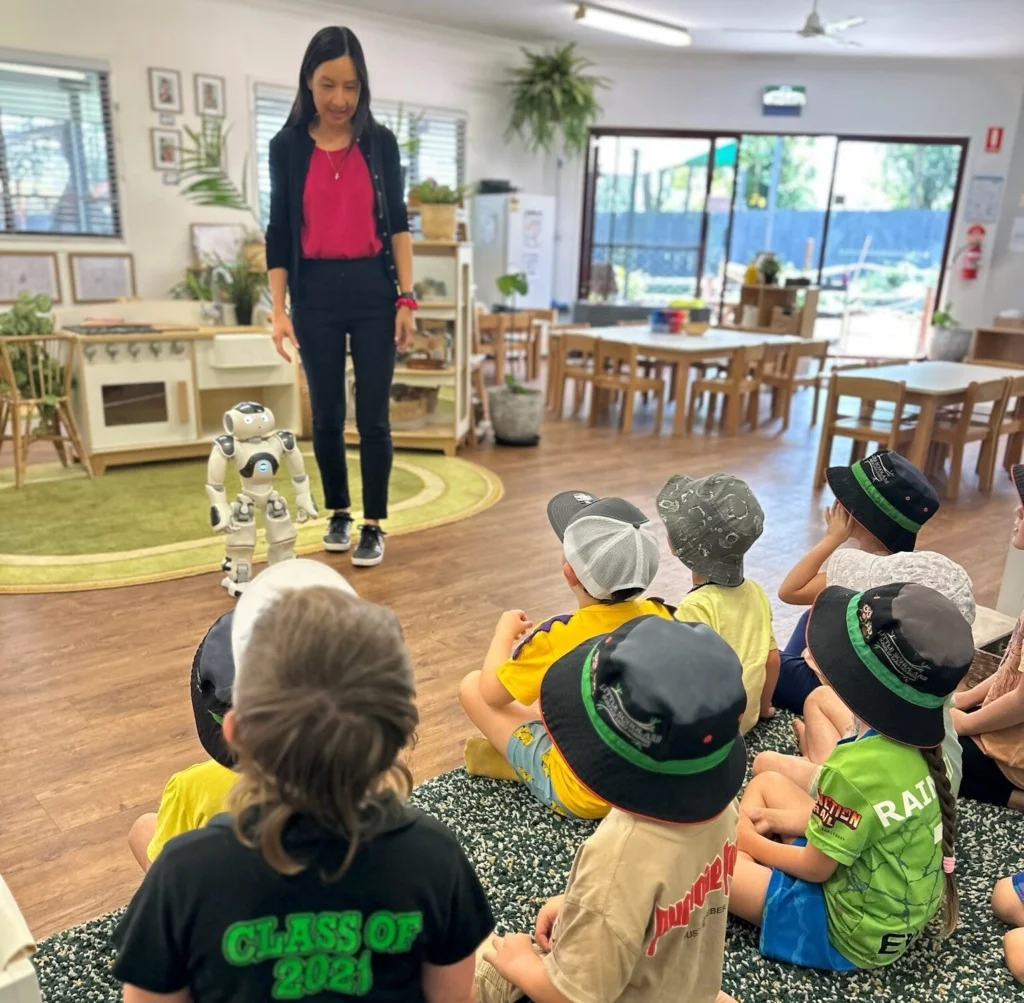
Little Scholars’ Yatala campus was buzzing with excitement as it welcomed Dr Michelle Neumann, Research Assistant Ruby-Jane Barry, and of course, NAO. The visits were part of an educational initiative that captivated the preschool and kindergarten children, as well as educators. The children couldn’t wait to see if Dr. Neumann and NAO had arrived and would dash to the parent lounge to check, educators reported.
The children had the opportunity for one-on-one interactions with NAO, participating in games like ‘Simon Says’, Q&A sessions, and activities focused on literacy.
Dr. Neumann, who leads the project, is an associate professor in early childhood education at Southern Cross University. She believes that this is a frontier that early learning is just starting to venture into.
Interestingly, Dr. Neumann’s journey into early childhood education began after becoming a mum to five children. With an honours degree in science, she decided to pivot her career towards education and early learning. She went back to university, earned her Graduate Diploma in Education, Bachelor of Primary Education, and then completed her PhD focusing on early literacy development. Her dedication has earned her a recent award for research excellence from Southern Cross University, recognising her work in early literacy, digital technologies (tablets, apps, social robots), child development, parent-child interaction.
While NAO has been used to support children’s learning about STEM (Science, Technology, Engineering, Maths) and coding, social robots also have the potential to be used to support language, literacy and social learning in the classroom, according to Michelle
“As a physically embodied version of a screen, a social robot may help young children from a range of diverse backgrounds develop their language and social skills,” Michelle said.
“Michelle and Ruby were so approachable and more than willing to let our little scholars meet NAO,” says Raylene, lead educator in the senior kindergarten room. “I was fascinated with NAO’s abilities, and the potential social robots could have in a classroom setting. As a lead educator, the benefits of having an additional learning assistant was something I was happy to advocate for, so I was quick to start drumming up more families to participate in the visits.”
Raylene said she had a lot of conversations with children preparing them for NAO’s visit, even conversations that maybe one day, the children might have robot friends to help their teachers in the classrooms.
“This was super exciting for the children. I did have to remind them and to the families that it wasn’t happening straight away, but the concept was well received. Families enjoyed the debates of whether it would take jobs from educators, and I enjoyed discussing this with them. By day two, Michelle and Ruby were needing to organise additional days to attend the service due to the influx of families wanting to participate,” Raylene said.
Raylene said on the first day, it was evident that although the children were excited, there were also plenty of nerves. Most of the children participated well, with a small handful quite shy, she said. As the program continued, the children got used to seeing Michelle, Ruby and NAO in the parent lounge, those children who were a little shy to begin with looked eager to have another turn.
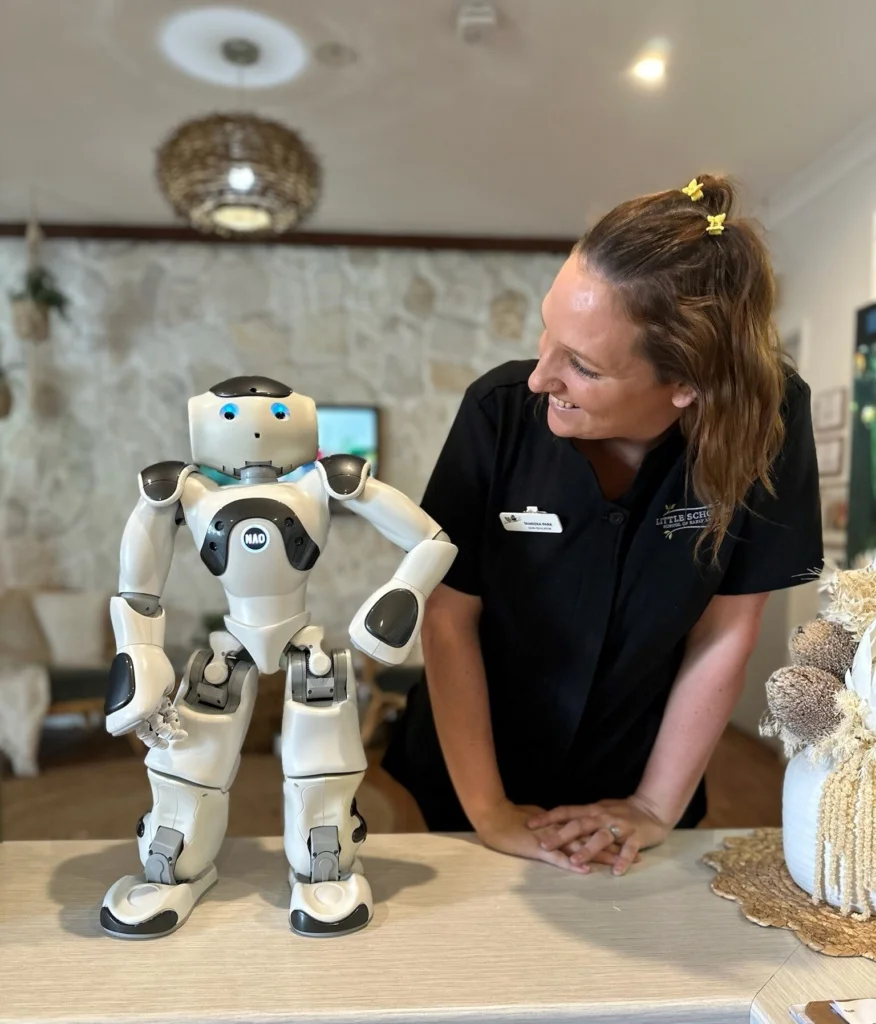
“This was obvious in my own son Tannen. Tannen was one of the few who participated on day one. The whole lead up was a confident ‘I’m having a robot friend’ until he got his robot friend,” Raylene said. “After his turn he told me he didn’t like it a lot because it was scary, however as the days went on, and more friends started to participate, and NAO became a familiar face, all of a sudden he was eager to come to the door to see if they were there yet, and talk to other children on the way in to see if they were going to go and play games with NAO that day. This is the way it unfolded for several children,” Raylene said.
After a few one-on-one visits to introduce NAO to children, Michelle made a final visit to introduce more campus children to NAO and play some games.
“You could see the comfort of the children who were already familiar with NAO, and it acted like a scaffold for the children who hadn’t had the chance yet to interact with him. Comments from children like ‘Oh, that’s just NAO’ and ‘I already played this game and it’s really fun’ to encourage peers along were incredible to hear because it was listening to four- to five-year-olds comforting each other and being confident with the experiences they had just had,” Raylene said.
Michelle said one day she’d love to introduce a full program which sees social robots in more early learning classrooms. But, she says, these are still relatively early days. Social robots are a work in progress, and she acknowledges they’re limited in what they can currently do. She’d love to also work with children who would benefit from additional language and literacy support. For that to work, NAO’s voice recognition needs development as it would need to have the ability to understand a spectrum of language milestones, she said.
“It would take a lot of time, guidance and professional development for educators… and a lot of support to be able to use the social robot in its current form,” she said. “But they’re working on AI generated social robots and these innovative opportunities may make using social robots more usable in the classroom.”
And, the robots are not cheap. NAO can cost up to $20,000 AUD, which she acknowledges would be financially prohibitive to many early learning settings. Michelle says her hope is that more research to can be done to better understand the role that social robots could play in supporting young children’s early learning experiences. With emerging advances in robotics, it may be possible that the production costs of these devices could one day become a more affordable educational tool.
The collaboration between Little Scholars and Southern Cross University has opened up new avenues for early learning, showcasing the potential of integrating social robots like NAO into educational settings. The overwhelmingly positive response from both children and educators alike underscores the limitless possibilities this technology could offer. As we look to the future, the hope is that advancements in AI and robotics will make these educational tools more accessible and tailored to the unique needs of early learners. This pioneering initiative serves as a testament to the boundless curiosity and adaptability of children, and the commitment of educators like Michelle and Raylene to push the boundaries of what’s possible in early education.
Jae Fraser, founder of Little Scholars, wholeheartedly supports the NAO project with Little Scholars.
“This is such an exciting project for our little scholars to engage in,” he says. “Introducing social robots to Little Scholars, isn’t just a leap in technology; it’s a giant step in nurturing young minds.
“We look forward to where this will go, and how we can use resources like this to continue the learning journey for Little Scholars.”
Additional information
The potential of social robots in early learning includes:
Potential barriers and obstacles for social robots in early learning:
Teaching a small child self-respect, to find and use his or her own voice can be one of the most valuable lessons you share as a parent or special adult in that child’s life. When children can speak up for themselves, this will help them in every aspect of their lives, for the rest of their lives. Having the ability to use their voices, they’re able to command respect, protect their feelings and their bodies, and increase their confidence in their ideas, their relationships and in various social settings. There are several facets to teaching a child to use his or her voice.
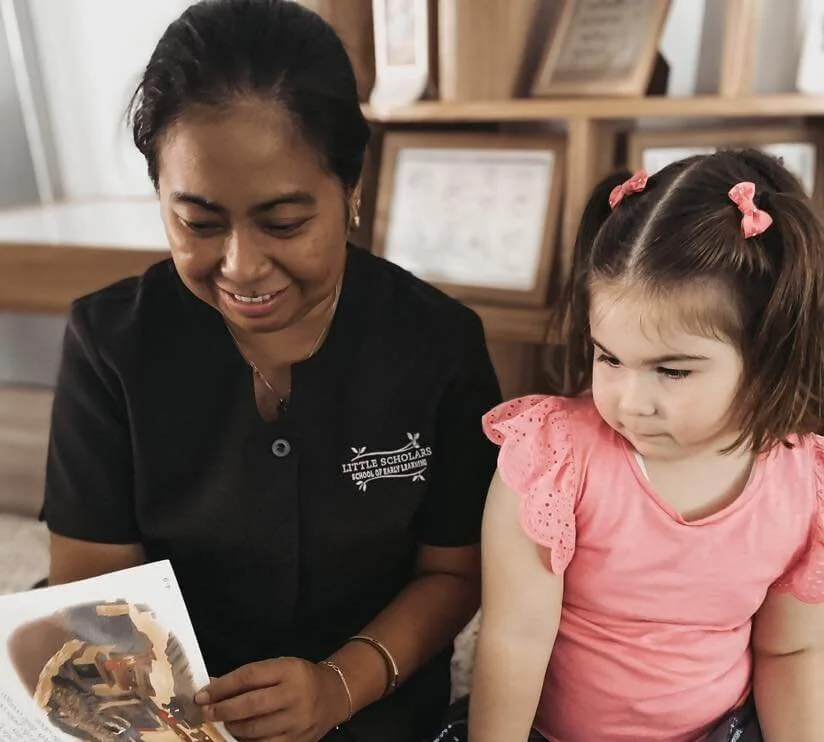
Allow your child to make choices about his or her body. You can start by allowing them choices on what to wear, and checking with them if it’s ok to help them dress or undress. This is the beginning of teaching your child about consent, even if he or she is a baby. Loved ones can also model consent by asking, ‘May I pick you up?’ or ‘May I give you a hug?’ and in the bath or nappy changes, asking permission before you clean or wipe your child in private places. Those conversations can lead to discussions about appropriate versus inappropriate touching, and even little children should expect to be asked permission from anyone who comes into contact with them. Even if they’re your children and you’ve been looking after them literally since day one, you’re showing them you respect their body by asking first.
This is the same in our campuses. It’s our policy to maintain the rights and dignity of the children, that includes in terms of nappy changing and toileting, so we try to provide privacy where possible from everyone in our campuses. Our educators are all trained in respectful care, and host not-for-profit visitors such as Bravehearts, who teach children about advocating for body safety, yes and no feelings, the difference between parents, trusted adults like doctors or educators looking after their bodies, versus strangers and unsafe adults.
We recommend teaching children young the proper names for their body parts and use them any time you are talking about them. When they’re first learning to speak, this can be a great bathtime conversation as you point out the names of various body parts. Keep any cringing when talking about body parts to yourself. The sexualised nature of private body parts — giggling or shame when talking about them — that’s adult stuff that we don’t need to put onto children.
“I teach my children “Your body belongs to you and you only” as well as naming their correct private parts which are theirs only,” says Holly, a lead educator in the Senior Kindy studio at our Staplyton campus. “Children really need to be educated about body awareness/safety.”
Why is teaching them proper names so important? Getting used to these conversations young can reduce embarrassment, something unnecessarily expressed by many adults and in previous generations, and establish ongoing communications with children about sex/sexuality. But most importantly, this educates and empowers little ones about their body safety, and research shows this could protect them from predators.
Explain to your child that nobody is allowed to touch our private parts unless it’s for hygiene or medical reasons and that people who have to come in contact with your child’s private areas have to ask permission first. But while there’s no shame in their bodies, they should also know there are parts of the body that are private and have it explained to them those parts are just for them.
Holly says additionally, they have conversations with the children with scenarios about stranger danger and the steps they need to remember in case anything like that happens. They also have conversations about who the children name as their ‘safe people’.
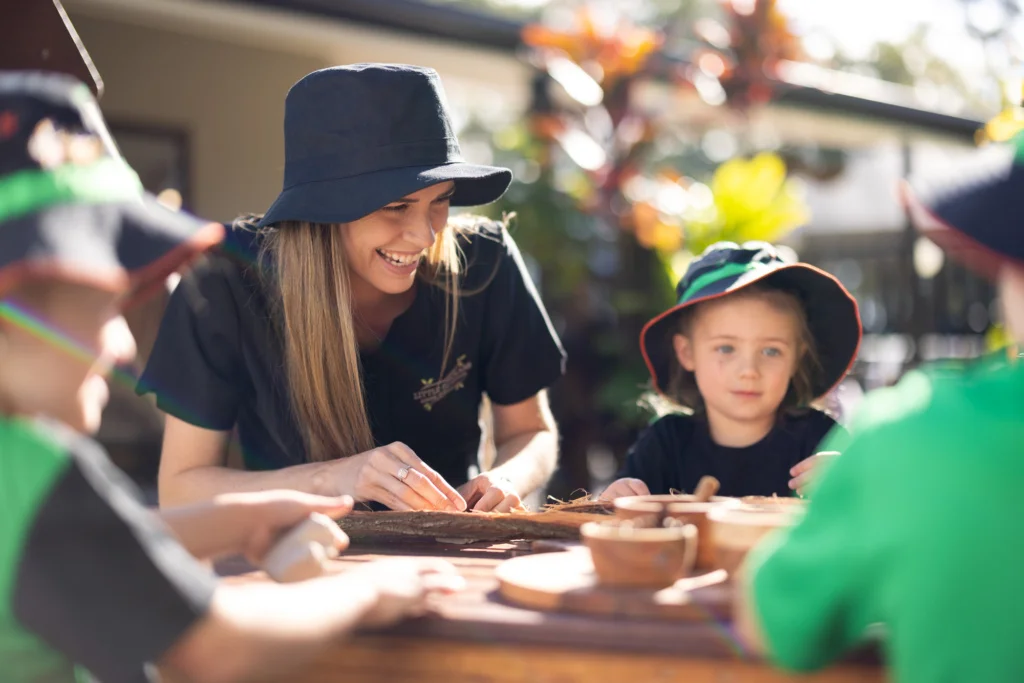
There are lots of ways to show children respect, and it’s important when you expect them to respect others. Try to refrain from talking about your child, especially in front of them, to others, or be mindful of what you do share. This shows your child you respect his or her privacy. You may remember a time when you were younger when a parent or someone you loved shared a story that embarrassed you – even as an adult, you remember. Your child could too. Before you tell a story, ask yourself how they’d feel about you telling it.
In our increasingly digital world, this also goes for sharing everything about them on social media. Once it’s online, it’s there forever. Even if it in theory disappears after 24 hours, screenshots can be taken. That also goes for other people’s children – other parents may not want them on social media, so keep online sharing to your own children. Consider what you are posting, would your child want to have a picture for the world to see of themselves on the potty or with a bare bottom when they’re older? Keep in mind others may Google them in the future; potential and current employers, associates, and most scarily, predators.
Another way you can show your child respect is by discussing inappropriate behaviour away from public settings. Keep important conversations for a time when you can discuss them privately. You may think embarrassing them by calling their actions out in public might stop them from doing it again, but this will likely backfire. You can say in public something like ‘We will have an important talk about this later.’ and stick to that. But highlighting negative behaviours in public only causes humiliation and shame, and no one needs to feel that way.
Don’t force children to hug or kiss anyone, even family. You could ask, for example, how they’d like to say greet people in each social situation.
“I offer children the choice of a hug, holding hands or sitting together as an alternative to allow them to make the choice. When saying hello or goodbye they can say just the words, high five, fist bump or hug, but it is always up to them,” says Claire, an educator from our Nerang campus. These options still teach them to be polite if that’s important to you, but shows them how they can do it within their comfort level and respects their physical boundaries.
Parents often focus on teaching children to be respectful, such as learning to apologise when in the wrong, but teaching children to just say ‘sorry’ versus understanding how their actions actually affect others and learning to own their actions is a better way to develop their emotional maturity. By asking the children questions such as ‘how do you think your sister felt when you hit her?’ or ‘how were you feeling when you broke that toy?’ and ‘what would you like people to do if they recognise they made you feel sad?’ will get them to begin to understand owning up to their mistakes and learning to say sorry meaningfully.
This is also where modelling comes in. It’s important to apologise to your child when you make a mistake. They learn from you, and by saying you’re sorry sincerely shows children that no one is perfect, that everyone makes mistakes, but it’s how we respond to them that counts. This could be done in other ways, rather than an adult yelling when angry, but by speaking kindly and respectfully to them, even when it’s difficult to, or if you’re setting a limit, children begin to understand their actions have consequences and can respond to situations differently in future.
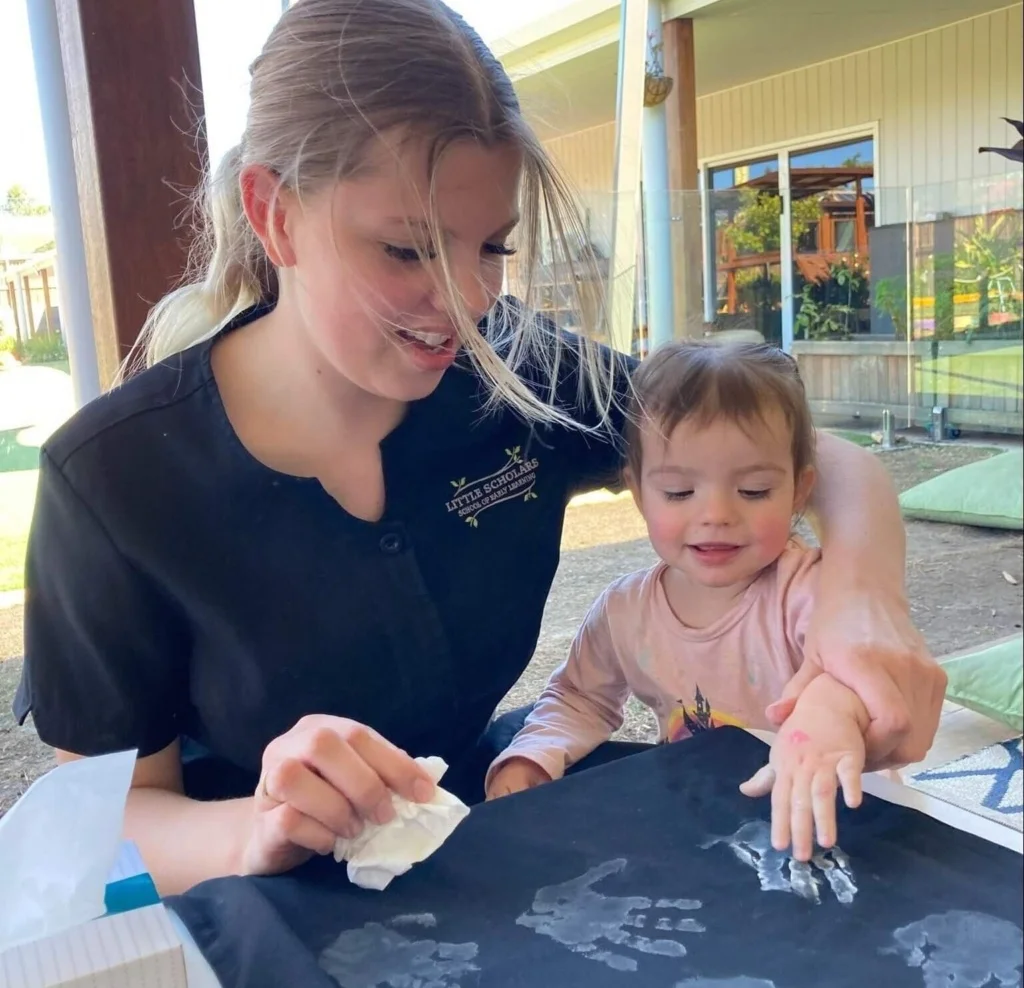
Let your child answer for themselves. Refrain from answering questions directed at them. If they don’t want to answer, don’t make a big deal about it.
“We use language to acknowledge how children feel for example, ‘I can see that you are upset, how can I help you?’” says Claire. “We use this language to help children to speak for themselves every day so it becomes second nature to them.”
We guide our educators to tune in to the behaviours, actions and emotions of the child to identify what they may be trying to communicate.
“Through listening to gestures cues, along with words, shows respect and ensures we are responsive to children and value their rights,” says Susan Cooper, group pedagogical leader for Little Scholars. “It is important for early childhood educators to validate what the children may be feeling and this is done by our educators asking the child about their emotions and setting spaces and environments where the children feel safe and secure to express their feelings comfortably.”
Tell them it’s OK to say ‘no’ if they feel unsafe or unsure. This teaches children and young people that it is OK to stand up for themselves and to be assertive if something doesn’t feel right. Following this, they should know that nothing is so ‘yucky’ that they can’t tell someone they trust about it. Hopefully, this is something your child never has to deal with, but if they’re asked to keep something secret that hurts them or makes them uncomfortable, then by talking to them about situations like this, they’ll speak up straight away and not worry about getting in trouble by breaking a ‘secret’. Teach them the difference between secrets, privacy, and surprises.
Here’s an explanation of the differences. A surprise is something that should be fun, happy, and temporary. Secrets that are meant to be kept for a long time are usually meant to protect someone or keep someone from getting in trouble. Although we want children to be wary of secrets (therefore, keep language in mind) —and especially to come to us when they have an unsafe secret—they also need to learn that some things should be kept private. Privacy isn’t about keeping someone from getting in trouble; it’s about respecting a person’s personal information.
Finally, please feel free to talk to your educators or campus managers about how they manage any of these conversations and talk to them about how you prefer it handled. We want your children and your family to feel respected and heard, safe and happy in our care, and if we can help with those conversations, we’d like to. These are also conversations you should have with extended family or people who will be in your child’s life.
Most importantly, model the person you want them to become. Children will remember their biggest role models their entire lives, so being a respectful, caring, supportive, confident adult influence will teach children the best person he or she can become. By showing them the respect they deserve and teaching them about self-respect, we’re setting them up for their future. Self-respecting and resilient children who spend time in positive, affectionate and supportive environments, led by clear and reasonable guidelines, and have healthy connections to parents and other adults, grow to be adults with the ability to bounce back from challenging situations their entire lives. And, all of the ways you show respect for children teaches them how they should show respect for others.
If you have a child at Little Scholars, you’ve likely heard of ‘The Collective’ but do you know what it is? We thought it might be time for an explainer!
Little Scholars School of Early Learning’s The Collective is a service-wide, multi-faceted educational initiative, designed to enhance each child’s learning and development and best support educators’ time spent with children.
The development of The Collective is based upon early childhood pedagogy. Children are provided the time and space to explore, imagine, create, problem solve and develop social groups and guided to find their individual learning journey. The Collective allows for educators to have freedom in how they document and plan for children. This supports a strength-based approach with our team and highlights individual skillset of our educators and value the multiple voices being heard, embedding a collective response to children’s learning.
Understanding the demands of documenting processes, Little Scholars wanted to create a streamlined approach to the educational program across all our campuses. The intention was to demonstrate quality over quantity, foster children’s growth, and develop them to become successful citizens and critical thinkers. This curriculum approach also supports educators to adopt theory and put it into practice. Educators, through observations of children’s play, conversations and their interactions within their environment, explore what the child might be thinking. This is then the beginnings of the planning process within our collective curriculum.
Alice Micklewright, campus manager of Little Scholars Burleigh, with her team, came up with the idea of The Collective and led its early development.
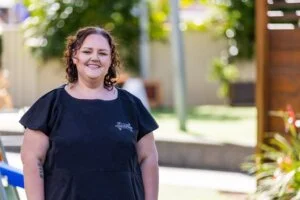
Alice Micklewright, campus manager of Little Scholars Burleigh
“I wanted to look at curriculum for a while because there were a lot of things that we felt were just kind of there but didn’t feel like they had a place, so streamlining that focus was good.”
“We had a lead educator meeting one night and we talked about how the educators were feeling in general, and some of the comments were just like ‘I feel like I spend more time writing things down than I do with children.’ They are still with the children most of their time, but when you’re feeling like you’re trying to focus on something else and not giving the whole attention to something and being present, it can be really unsettling.”
That was at the peak of the pandemic crisis, according to Alice, and her team became cognisant that what they were doing in the moment was far more important than anything else.
“The first conversation we had, we looked at what we were doing and wrote down notes on the back of the pizza box – ideas about why we’re doing what we were doing, what the processes were and what we felt didn’t really fall within the planning cycle appropriately for it be conducive to having good outcomes for everybody involved.”
“We really started The Collective off the back of our Engagement Initiative – that’s the one day a month we have with no documentation of photos, no technology. It was purely based on educators getting back in touch with engaging with children and not focusing so much on some of the perceived pressures that have come about in the sector in terms of things like families’ expectations on photos being received, and the amount of documentation that sometimes can spiral. It is a regulation for services to demonstrate planning toward an educational program for children. We wanted a streamlined approach to guide our campuses to set the benchmark to support and engage.
“It’s really been child-driven on the focus of what we want to do,” she says.
Melanie Excell, Operations Manager for Little Scholars, agrees.
“When we started this process, we gathered information from a variety of different perspectives – including families and children, and professional training and resources,” Mel says.
There was a vast amount of training for educators to understand new processes.
“At its core, it’s really been just trying to pare back what we were doing to deliver quality curriculum for children, that supports their outcomes and their developmental needs, to generate a stronger culture of critical thinkers in terms of children and educators,” Alice adds.
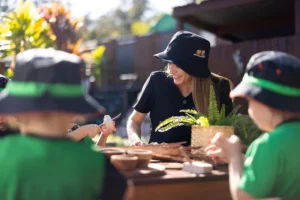
Weekly, rather than daily, detailed written updates are now sent to families, allowing educators to focus more on being with children. Families still get photos daily to see what their child has been learning and enjoying that day, but learning outcomes, routines, links to Early Years Learning Framework and research are saved for the end of the week, and individual child updates are sent out termly.
“Sometimes you find that services will continue to add a lot of documentation [about each child] and to try to meet the needs of the framework and the standards, when it can be a lot simpler and child focused,” Alice says.
The critical reflection component of the curriculum is most important, according to Alice.
“Everything we do really needs to have a purpose, a thought behind it and a reason why we want to engage in it that way, and then involving the children in that process and the families as well.
“If you look at the planning cycle in the National Quality Framework (NQF), you gather information from an idea or interest that children have, engage the children in what they’d like to do moving forward and analyse the information you’ve gathered, plan for it, then reflect and review is the whole cycle.”
For example, educators might look at children who are engaging in an activity and would consider it across developmental milestones and outcomes what they think the children are trying to achieve. In a nursery, where early learners can’t yet speak, educators might observe a child picking up resources and putting them into a basket and taking them back out, a learning behaviour known as a schema.
“Children are exploring all of these different concepts every day, even though you may not realise because they’re playing and it’s natural for them to do that,” says Alice.
The use of open-ended questioning with children supports the understanding of their play and helps gain a child’s perspective as opposed to an adult’s agenda.
The planning comes from what educators talk about in the moment, and educators act on what they’ve gathered, followed by a review at the end, where they decide if they activity worked well or didn’t, and if it didn’t, questioning why – were the children just not interested in that topic anymore, and is there a reason why?
Little Scholars produces individual learning journeys for each child that highlight significant milestones and achievements to their development whilst in our care. Various modes of documentation record the learning identified through the child’s participation in our program.
Little Scholars sends out the personalised mid-year assessments to the families and then the end of the year they’ll receive a transition letter which wraps up their child’s journey, acknowledging achievements and progress in their studio.
“One of the other points we highlighted when we started reviewing the curriculum, is that we wanted to educate our families that what we were doing. We know that there’s a lot of electronic information available as well, but the value of that face-to-face conversation and relationship with staff and families, is important too,” Alice says.
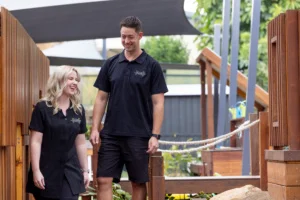
The Collective allows for educators to have autonomy in how they document and plan for children. This supports a strength-based approach with our team,” according to Susan Cooper, group pedagogical leader for Little Scholars. “It highlights individual skillset of our educators and value the multiple voices being heard, embedding a collective response to children’s learning.”
Alice says it’s still a process that Little Scholars is undergoing.
“Ultimately, it’s important that we have educators here who feel stable and like they want to contribute and that they are getting recognised for the things that they’re doing, and we believe The Collective does that.”
Jae Fraser, founder of Little Scholars agrees. Little Scholars wants to ensure educators feel seen, heard and valued, because our educators’ passion for our children and their education is why we’re delivering exceptional educational play-based programs.
“We really care about and listen to our teams, so when they are feeling pressured due to significant amount of paperwork, we act,” says Jae. “It’s all about the educators and the children, so if we can achieve amazing outcomes without all the unnecessary paperwork, and children and educators are interacting and engaging in really meaningful ways – this is what we need to focus on.”
More about Little Scholars:
Book a tour today!
In today’s fast-paced world, science, technology, engineering, and mathematics (STEM) are the driving forces behind innovation and progress. To equip the next generation with the skills they need to thrive in this exciting landscape, we have to recognise the incredible impact of early childhood education. A recent study conducted by researchers at the University of California Irvine has revealed the transformative power of high-quality early childhood education and care (ECEC) in nurturing children’s STEM achievements throughout their educational journey.
The study’s findings are both exhilarating and promising. They show that children who have access to top-notch ECEC before starting school are more likely to excel in STEM subjects as they progress into high school. This underscores the vital role of investing in early education and providing children with the necessary tools and support to build a strong educational foundation.
The researchers identified two key factors that contribute to the success of early childhood education in fostering STEM abilities. Firstly, igniting children’s curiosity through cognitive stimulation has a profound impact on their problem-solving skills and overall STEM performance. Early childhood educators who create engaging learning environments and incorporate hands-on experiences play a pivotal role in nurturing children’s passion for STEM. Secondly, the study emphasised the crucial role of educator sensitivity and responsiveness. When educators demonstrate empathy, attentiveness, and genuine care for children’s needs, it not only supports their overall development but also significantly influences their STEM achievements. The emotional connection established during these early years lays the foundation for children’s social-emotional skills, which are closely intertwined with cognitive development.
Interestingly, the study also revealed that sensitive and responsive caregiving in early childhood has an even greater impact on STEM performance for children from low-income families compared to their peers from higher-income backgrounds. This finding highlights the importance of addressing equity in early education and ensuring that all children, regardless of their socioeconomic status, have equal access to high-quality early learning that fosters STEM engagement. Speaking of STEM, did you know that Little Scholars offers an exciting STEM program for our kindergarten children? In collaboration with our friends at Lab Kids, we provide an incredible educational STEM program that aligns with the Early Years Learning Framework and the Australian National Curriculum. From exploring motion and states of matter to learning about light, sound, and chemical reactions, our curious little scholars embark on an exciting journey of STEM discovery!
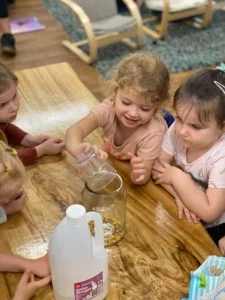
Finally, the University of California Irvine study reinforces the immense value of early childhood education in nurturing STEM success. By providing high-quality early learning that fosters curiosity, responsive caregiving, and an inclusive learning environment, we begin to realise the full potential of our Little Scholars. Book a tour at Little Scholars.
We have the very best early education educators at Little Scholars School of Early Learning. It’s our great honour to present our 2023 Little Scholars Employee Award winners. 🎖
These outstanding recipients, through some challenging times, have demonstrated their dedication, commitment and have gone above and beyond this year with fellow educators, children, and parents. Time and time again they show us, their peers and the families who they have the privilege of looking after their enthusiasm, their eagerness to learn and grow, and their unfaltering dedication to educating and developing small humans.
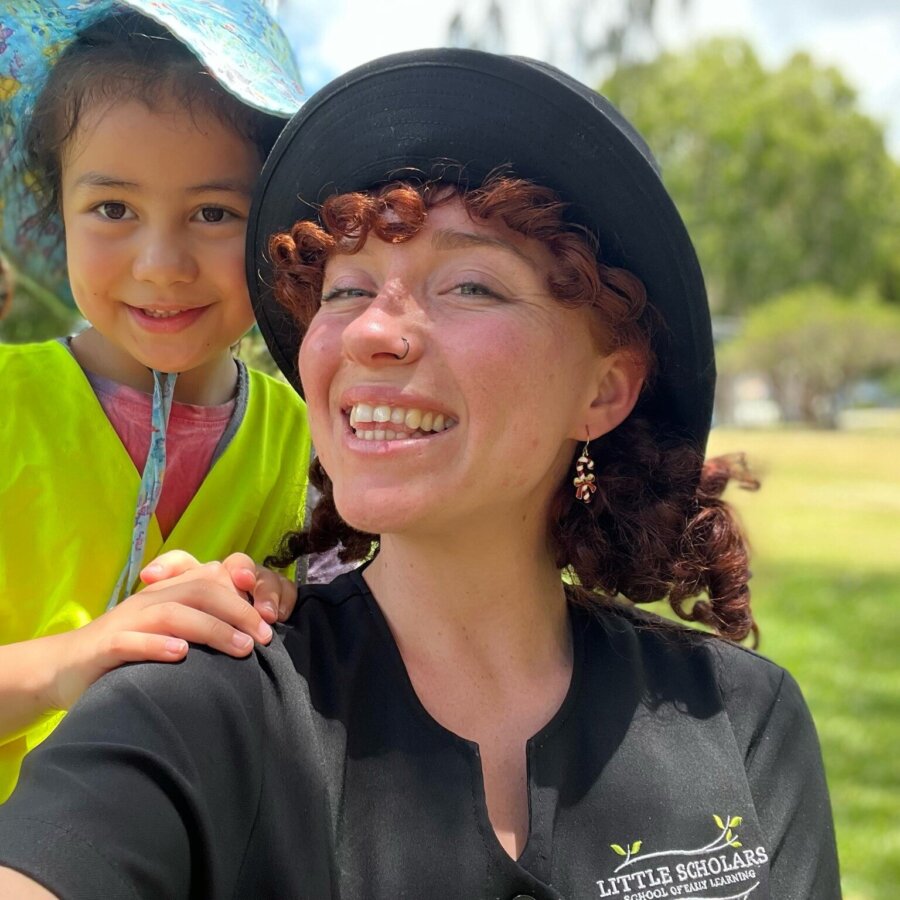
Inspire – Little Scholars Pillar Award 2023
Learn more about Ella
How long have you been an educator, Ella?
I have been an educator for four years now, and with Little Scholars since my placement when I began my certificate 3 at TAFE.
How did you start your career?
I had been looking at Little Scholars as a centre for my daughter since I was pregnant and fell in love with it from the get-go. Since beginning to have my daughter at the centre, I saw the love and care that the educators gave the children. Working with children had always been on my agenda as I used to study to be a music teacher and knew I could do so much more as an early childhood educator to assist the children in excelling in all areas before beginning “big school.”
What did being recognised for the inspire award mean to you?
The award completely blindsighted me as I turn up to work each day just to do my best for these little humans so to be recognised for my relationship with the children in my centre was so special to me and really instilled my role within the company and the importance I hold alongside my other educators in this industry.
Ella’s nomination
Ella is an educator with the Little Scholars Deception Bay campus, which recently was assessed Exceeding under the National Quality Framework for Early Childhood Education and Care.
In Ella’s nomination to us, it said, “Ella is an inspiration for all in the Deception Bay community. We had some outstanding feedback from the department through our assessment and rating process. Before the process even started, the assessor had mentioned the passion and authenticity observed in Ella’s interactions with our children, families and community. In the assessor’s words – ‘she could sit and watch Ella all day long.’ From one of Ella’s colleagues, ‘the educator she is, is who I aspire to be in my future teaching career. She is strong, but also so caring to each individual child.’
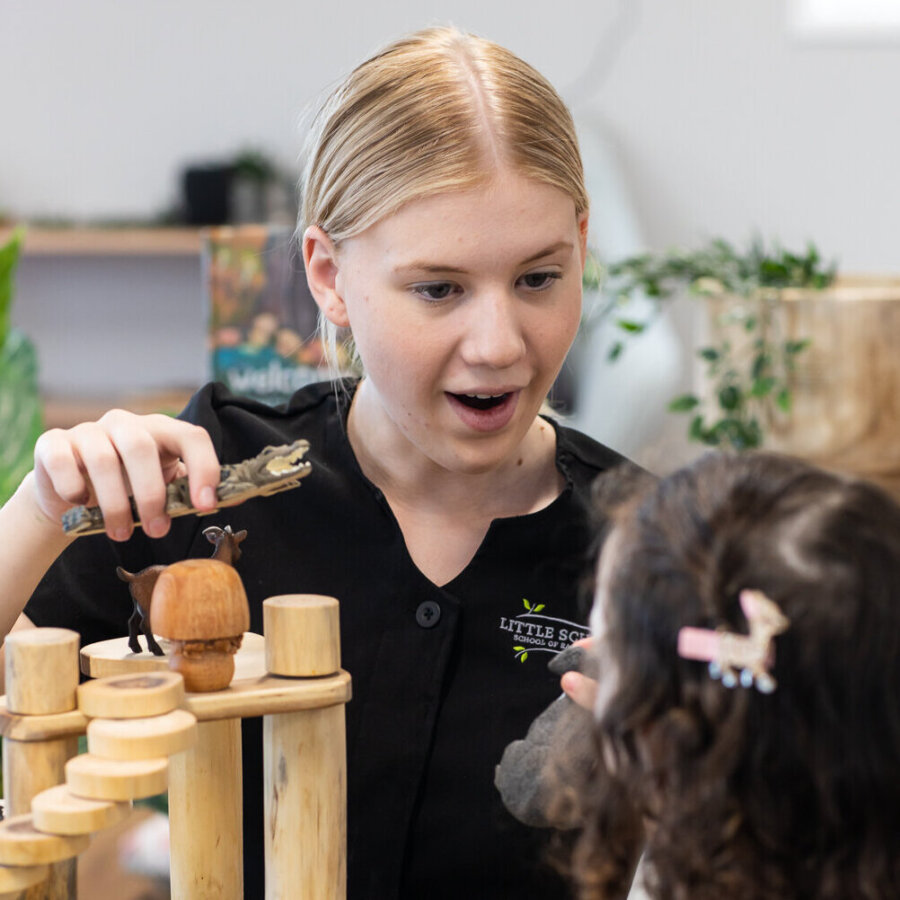
Learn – Little Scholars Pillar Award 2023
Learn more about Ellissa
Ellissa is a lead educator at our Ormeau Village campus. She was named winner of the Pillar Award in the Learn category because she stepped up to become a lead educator, and we’re told she is always happy to keep learning from her peers and further her education in the sector.
How long have you been an educator?
I’ve been an educator since I was 16, but even younger I was at my mum’s centre helping out wherever I could.
How long have you been with Little Scholars?
I’ve been with Little Scholars for about 18 months, since Ormeau Village opened.
What made you want to become an educator?
I think just having the inspiration of my mum being in that environment, seeing what she does, seeing how she helped shape the children, it made me want to do it as well. Just seeing how I could help children as well.
What did winning the award mean to you?
I’m always trying my absolute best to do the best possible work I can do, so it meant that someone else was seeing that, that it was appreciated. It’s made it feel worth it!
What do you like about working with Little Scholars?
Just the support and having the creative freedom to do things that I couldn’t do at other places. Like taking them on Bush Kinder adventures and all these other fun things they get to do that they may not have the opportunity to do anywhere else. And everyone at head office as well, like Susan, Mel and Jae-them being so active in our centre, that’s something I really appreciate as well.
On the quick move from an assistant educator to lead educator, Ellissa says:
The support I had helped me to grow so fast, because if I was somewhere else and didn’t have the support, I probably wouldn’t have become lead, but the support from everyone about what I could do, what I would have to do, really helped when I stepped up.
Ellissa is finishing up her studies with her Cert III, then she’ll be moving onto her Graduate Diploma.
From the award submission: Ellissa has stepped up into her Lead role during last year and we have watched her grow from assistant to well-deserved Lead and take charge in her space, leading her colleagues while taking feedback on board and striving to excel.
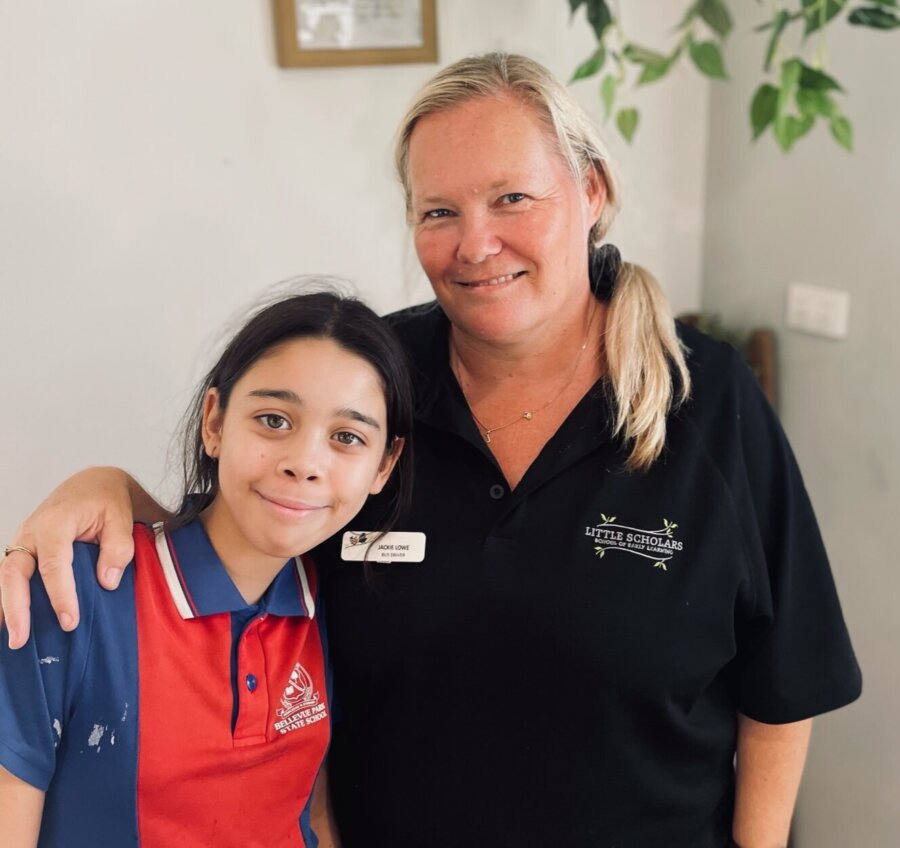
Contribute – Little Scholars Pillar Award 2023
Learn more about Jackie
How long have you been in educator?
I’ve been an educator on and off for about 20 years. I’ve been with Little Scholars for a year now.
Hey that’s pretty good to get recognised in your first year!
I know it was so good!
What’s made you want to become an educator?
Just from being young and starting off babysitting, which I loved, and then Year 12 back then we had work experience and that was just going to a centre and from that first day I knew what I wanted to do. I just fell in love with it, and from then it was my goal to finish school and become an early childhood teacher
What is it now, 20 years on, that you still love about working in this sector?
It’s just the love of being around children, i’m just being with a team of educators, and I missed that like when I went away from it and did my business, I just missed it so much. It’s just working children just gives me so much joy.
All my children are older, are grown up, and it was just not a grandmother yet or anything it was just that feeling, it just going back into a centre and it just makes me so happy.
You won the Pillar Award for ‘contribute’ and you’re known as a ‘jack of all trades’, what do you do?
No job is too big or too small! I do the bus, I’m the after-school care educator, I can work in the kitchen, I can listen to other team members, there’s nothing that I won’t try! That’s just who I am, when I’m needed, I’ll do anything to help the team out.
Especially your first year at Little Scholars, what did winning an award mean to you?
My goodness, it was just so good, firstly I was surprised, but it was then good to know that the little things that I’m doing are noticed, I felt like, ‘Wow I am noticed!’ It just made me feel so happy knowing that all the jobs that I am doing people have recognised it, so yeah so then makes you feel like you are doing a great job!
I love working for Little Scholars. It’s an amazing company, I’ve worked with the other centres before, Little Scholars is just amazing and I’m happy to be there and helping out.
In Jackie’s nomination, campus manager Elise said, ‘Jackie is our jack of all trades! Jackie fits many hats at our campus. From driving the bus to being in the studios to going on vacation care, she wears her many hats with a smile on her face. Her bubbly nature and willingness to help the team wherever needed is admirable. We appreciate her dedication and consistent contribution to the campus.
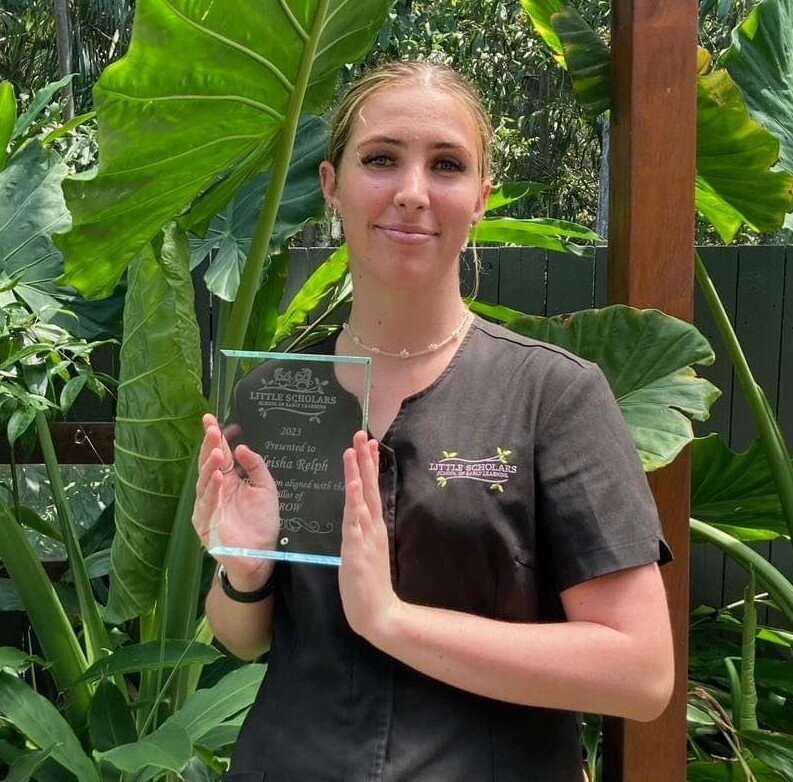
Grow – Little Scholars Pillar Award 2023
Learn more about Aleisha
Ellissa is a lead educator at our Ormeau Village campus. She was named winner of the Pillar Award in the Learn category because she stepped up to become a lead educator, and we’re told she is always happy to keep learning from her peers and further her education in the sector.
How long have you been an educator?
I’ve been an educator since I was 16, but even younger I was at my mum’s centre helping out wherever I could.
How long have you been with Little Scholars?
I’ve been with Little Scholars for about 18 months, since Ormeau Village opened.
What made you want to become an educator?
I think just having the inspiration of my mum being in that environment, seeing what she does, seeing how she helped shape the children, it made me want to do it as well. Just seeing how I could help children as well.
What did winning the award mean to you?
I’m always trying my absolute best to do the best possible work I can do, so it meant that someone else was seeing that, that it was appreciated. It’s made it feel worth it!
What do you like about working with Little Scholars?
Just the support and having the creative freedom to do things that I couldn’t do at other places. Like taking them on Bush Kinder adventures and all these other fun things they get to do that they may not have the opportunity to do anywhere else. And everyone at head office as well, like Susan, Mel and Jae-them being so active in our centre, that’s something I really appreciate as well.
On the quick move from an assistant educator to lead educator, Ellissa says:
The support I had helped me to grow so fast, because if I was somewhere else and didn’t have the support, I probably wouldn’t have become lead, but the support from everyone about what I could do, what I would have to do, really helped when I stepped up.
Ellissa is finishing up her studies with her Cert III, then she’ll be moving onto her Graduate Diploma.
From the award submission: Ellissa has stepped up into her Lead role during last year and we have watched her grow from assistant to well-deserved Lead and take charge in her space, leading her colleagues while taking feedback on board and striving to excel.
At Little Scholars, we have four pillars that underpin everything that we do at Little Scholars – for our children, families, educators, and our community.
As part of our annual awards, we have four awards dedicated to those Little Scholars’ values – learn, grow, inspire and contribute. This year, while our award-winning educators certainly personify all four pillars, but with their unique special skills and achievements, we’ve declared one clear winner for each pillar.

Ellissa at our Ormeau Village campus was named winner of the Pillar Award in the Learn category because she stepped up to become a lead educator, and she is happy to keep learning from her peers and further her education in the sector.
Ellissa is finishing up her studies with her Cert III, then she’ll be moving onto her Graduate Diploma.
From her submission: Ellissa has stepped up into her Lead role during last year and we have watched her grow from assistant to well-deserved Lead and take charge in her space, leading her colleagues while taking feedback on board and striving to excel.

Ella’s experience as a parent with a child at Little Scholars was actually the reason she became an educator herself! Ella is the recipient of an Inspire Little Scholars Pillar Award 2023.
Ella’s nomination
Ella is an educator with the Little Scholars Deception Bay campus, which recently was assessed Exceeding under the National Quality Framework for Early Childhood Education and Care.
In Ella’s nomination to us, it said, “Ella is an inspiration for all in the Deception Bay community. We had some outstanding feedback from the department through our assessment and rating process. Before the process even started, the assessor had mentioned the passion and authenticity observed in Ella’s interactions with our children, families and community. In the assessor’s words – ‘she could sit and watch Ella all day long.’ From one of Ella’s colleagues, ‘the educator she is, is who I aspire to be in my future teaching career. She is strong, but also so caring to each individual child.’

Jackie is an educator at Little Scholars Ashmore campus. In her first year working for us, she was nominated for a Pillar award!
Jackie’s nomination
Campus manager Elise said, ‘Jackie is our jack of all trades! Jackie fits many hats at our campus. From driving the bus to being in the studios to going on vacation care, she wears her many hats with a smile on her face. Her bubbly nature and willingness to help the team wherever needed is admirable. We appreciate her dedication and consistent contribution to the campus.

Aleisha has remarkable attributes and we’re told her growth as an educator has been propelled by her enthusiasm to contribute, learn and inspire her team and go above and beyond not only for children, but families as well.
I have been an educator since the end of January 2020. Prior to this, I was a trainee at Little Scholars Nerang since September of 2018 studying my Diploma.
Aleisha’s nomination
Aleisha at our Nerang campus was named winner of the Pillar Award in the Grow category because she’s grown from a trainee at the campus just a few years ago to now full time lead educator, her gentle touch, her willingness to inspire and help others, she was a clear choice for campus manager Renee.
Aleisha is no stranger to accolades, she won Educator of the Year – Peer Choice twice previously. Little Scholars was her first employer in her early childhood education career!
At Little Scholars School of Early Learning, we’re dedicated to shaping bright futures and instilling a lifelong passion for learning. With our strategically located childcare centres in Brisbane and the Gold Coast, we provide tailored educational experiences designed to foster your child’s holistic development.
Let us hold your hand and help looking for a child care centre. Leave your details with us and we’ll be in contact to arrange a time for a ‘Campus Tour’ and we will answer any questions you might have!
"*" indicates required fields
Let us hold your hand and help looking for a child care centre. Leave your details with us and we’ll be in contact to arrange a time for a ‘Campus Tour’ and we will answer any questions you might have!
"*" indicates required fields